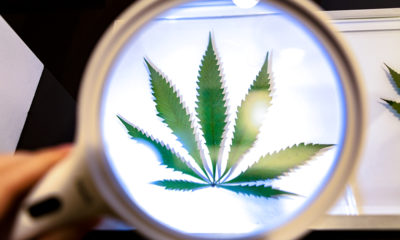
Medical
Canada Legalizes Medical Cannabis in All Forms
Medical marijuana patients in Canada will now be able to treat themselves with edible forms of marijuana following a historic ruling from the the country’s supreme court.
Prior to the ruling of legalizing medical cannabis, smoking was the only legal way for Canadian medical marijuana patients to use their marijuana according to Sections 4 and 5 of the Controlled Drug and Substances Act. These sections specifically banned any form of medical cannabis other than smoking “dry herb” material to be used by qualifying patients, meaning that any oils, extracts or edibles were illegal to possess or use – even if they did have a legal prescription to use medical marijuana.
The new ruling from the Supreme Court of Canada deemed those sections of the CSA “null and void” and patients are now free to choose the best method for which they wish to consume their medical marijuana.
The decision sprang forth from a 2009 arrest involving Owen Smith, head baker for the Victoria-based Cannabis Buyers Club. The Cannabis Buyers Club is an organization that aids in distributing medical marijuana to patients who have trouble acquiring medication through dispensaries due to their ailments. Smith was found to be in possession of more than 200 various marijuana edibles and 26 jars of marijuana oils, with which he used to make products like medicated massage oils and lip balms.
During his trial with the lower courts, Smith argued that the law under which he was charged was, in fact, unconstitutional. He claimed that it violated a part of Section 7 of Canada’s Charter of Rights and Freedoms, which states: “Everyone has the right to life, liberty and security of the person and the right not to be deprived thereof except in accordance with the principles of fundamental justice.”
Smith claimed that even though he’s not a medical marijuana user himself, the two laws were in conflict and hindered patients from accessing the “security of the person” promised in their inherent rights as a Canadian citizens.
Smith was then acquitted by the lower court and brought before the appeals court, who then pushed the trial up to the Supreme Court of Canada for a ruling. After large amounts of research and debates from both advocates and dissenters, the SCC unanimously agreed that access to all forms of medical marijuana available should be allowed for qualifying patients, as restricting them this access was, in fact, a violation of their rights.
After hearing the ruling, Smith stated that it had been “a very emotional day.” In a statement at a press conference in Victoria, B.C., he explains: “I’m proud and really happy today for all those people who are going to benefit from this ruling.”
David-George Oldham, the founder of the ARC, a group of cannabis patients, doctors, activists, and chemists, said: “It’s positive — it’s a great thing for patients… and people who need extracts who can’t smoke their cannabis or don’t even want to in the first place.”
“Imagine smoking seven grams of cannabis when you’re having a migraine so bad that just moving your fingers is excruciating pain. Taking a [cannabis] pill is a lot more sensible and having pills stocked in my cupboard makes a lot more sense than having just raw cannabis out and about in my house.”
And while this may be a fantastic ruling for medical marijuana patients throughout Canada, there are still those unhappy with the new laws have expressed mixed reactions. Health Minister Rona Ambrose claims in a statement that she is “outraged” by the Supreme Court of Canada’s decision. She claims that if the SCC is to make using the drug easier, then it will increase its use in unregistered, unqualified and underage citizens. She claims that the non-smokable forms of marijuana could be more appealing to younger users, who could easily eat a brownie or take a pill and feel the same effects.
One of her main arguments against the case is that the Supreme Court of Canada does not have the expertise or authority to decide if a substance is medicinal or not. She claims that “there’s only one authority in Canada that has the authority and the expertise to make a drug into a medicine and that’s Health Canada.”
Additionally, she claims that the ruling could be potentially dangerous to medical marijuana users, explaining that “marijuana has never gone through the regulatory approval process at Health Canada, which of course, requires a rigorous safety review and clinical trials with scientific evidence.”
Ambrose has made a statement that Health Canada will not back down from its fight against marijuana.
“We will continue to combat it. We will continue our anti-drug strategy, we will target youth with the message that marijuana pot is bad for them,” the minister said.
How do you medicate? Share with us in the comments?






















